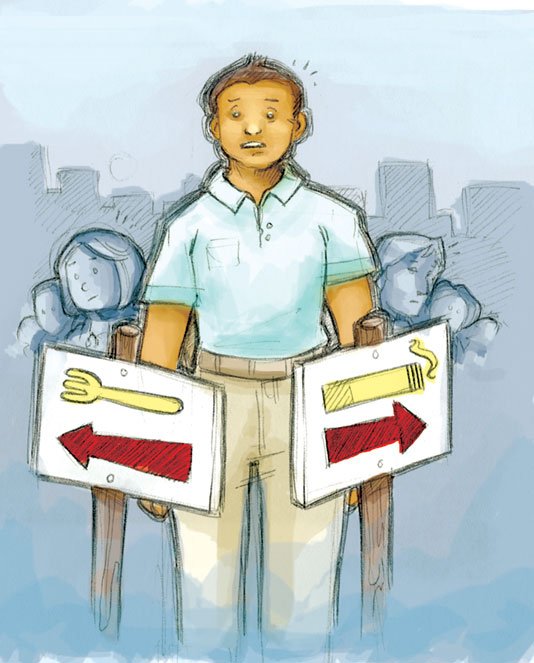Some restaurant owners are still unsure how the recent ban on smoking in all businesses except bars will affect their business.
Under the leadership of President Leslie McLemore, the Jackson City Council updated a 2003 ordinance barring smoking in public places (which had exempted bars and restaurants) to include all businesses with the exception of bars. The city defines bars as establishments in which the gross receipts for the sale of food do not exceed 25 percent of the total gross receipts. The city applies the definition to cocktail lounges, nightclubs and taverns. It is a definition that seems to hold little merit with state law.
The new ordinance expands to restrict smoking in restaurants with attached bars.
Violators, upon conviction, will be guilty of a misdemeanor carrying a fine of up to $50, per violation. Businesses that violate the ordinance are liable for a misdemeanor fine of up to $100. A second conviction within the same year doubles that fine to $200, and a third conviction raises the fine to $500.
The ordinance marks a change from one approved in March by the council's Planning Committee. That earlier ordinance dictated that restaurants with attached bars could continue to allow smoking in the bar area, so long as the bar and restaurant areas contained separate ventilation systems with no air exchange between them.
Some Jackson business owners are baffled as to what the partial ban will mean to their business or what new costs they will incur adapting to it.
"It's too early to comment without figuring out where the gray areas are," said Jay Schimmel, owner of Schimmel's, on State Street. The restaurant has an adjoining bar and currently allows smoking in the restaurant section, but only later in the evening, when the live entertainment kicks in. "As a whole, I think I have a duty to make smokers and non-smokers happy, and I'll do the best I can."
The new ordinance does not regulate restaurants with a stand-alone bar, meaning a bar that does not share "any common entryway or common indoor area with any other enclosed workplace, including (the) restaurant (section)," according to the language of the ordinance.
Schimmel's business does not currently fall in that category, but he said he was contemplating the possibility of separating the entryways for the bar and restaurant sections of his establishment. He said he was not sure at this time if the renovations would be enough to address the new ordinance.
The council has granted his business and others until next February to comply.
Ethan Blase, bar manager at The Bulldog, said he does not think his business would fall under the demands of the new ordinance because he believes it qualifies as a "bar" in the eyes of the city.
But the partial ban may prove more difficult to understand than a blanket ban on both restaurants and bars. The city defines a bar by the 25-percent rule, but state law does not seem to attempt to define a bar, and merely categorizes it as a restaurant.
The state defines a restaurant as a business with 25 percent of its revenue derived from cooking and serving, rather than the sale of beverages. The city's municipal definition of a bar as an establishment whose food sales must not produce more than 25 percent of the business's revenue seems to run counter to that.
Officials at the Mississippi Tax Commission say the commission can only issue alcohol permits to restaurants, hotels or clubs, however. The agency has a precise definition of all three business modelsand a business whose food sales revenue cannot surpass 25 percent does not seem to be among them.
Schimmel said he would have preferred a statewide ban over a rash of municipal decisions, which he said delivered an inconsistent slew of bans that tampered with competition.
Other cities have already passed a variety of smoking bans, many of which extend over both restaurants and bars. The towns of Amory, Greenwood, Kosciusko, as well as college towns like Hattiesburg, Oxford and Starkville, among others, have bans that affect restaurant patrons. Two Jackson bedroom communities, including Madison and Ridgeland, have also banned smoking in both restaurants and bars, with no reports of businesses in those two cities closing as a result of the ban. But some councilmen fear these smaller towns should not be compared to Jackson.
"We must be mindful that Jackson is not one of these little suburb communities. It is a city that is trying, for one thing, to incubate a district with resort status," said Ward 6 Councilman Marshand Crisler, who fretted that a ban of any kind may have a negative impact on the incoming Farish Street Entertainment District.
The embattled district only recently staggered over its latest obstaclea state law banning businesses selling alcohol within 100-feet of the Mississippi College School of Law. The Senate barely passed a bill last week in special session excluding Farish Street from that law.
Cato Walker, vice president of Memphis-based Performa Entertainment Real Estate, which is doing the Farish Street renovation, said the smoking ban is a non-issue compared to all the other issues facing Farish Street.
"There's already a smoking ban on Beale Street, and the clubs are doing fine under those circumstances," Walker told the Jackson Free Press. "B.B. King and all those clubs already have no smoking. The economy is actually doing more damage than the smoking ban up there."
Spokespeople for other businesses, such as Cracker Barrel, told the JFP in March that they would probably be able to adapt their family-style restaurant to a smoke-free environment without hard repercussions, so long as other Jackson family-style restaurants complied with the ordinance.



Comments
Use the comment form below to begin a discussion about this content.